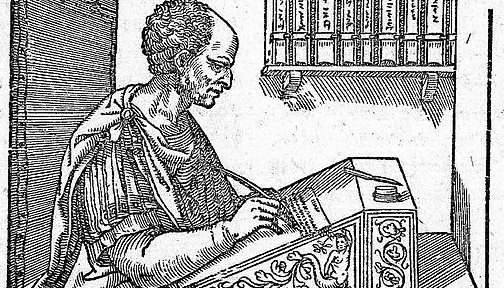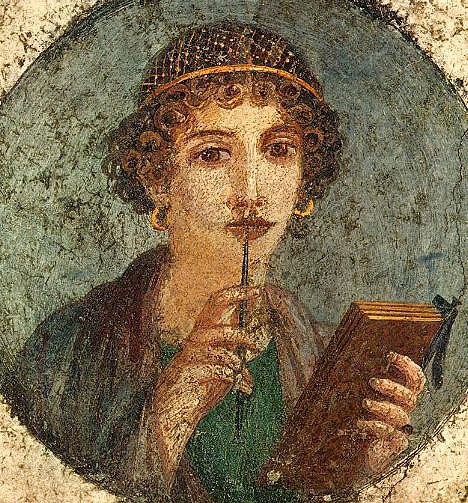
Ever since the invention of writing, authors have struggled with their craft. Modern writers apply word processing software, then email their text to editors, who comment and correct. Then, if they are lucky, the book is printed by machines and destributed via a modern transport network. Commercials market their work, and we pay for the product in stores. But what was the reality of writing and reading before all this, before the machines, the computers. How much has really changed? We asked a scholar of Latin and Greek classics.

Historyradio.org: There are many ways of looking at ancient literature. In what ways would you say that writers during the classical period innovated, broke rules and experimented?
Professor Richlin: Ancient literature was like jazz: a strong traditional basis, with performers or writers making a name for themselves by the way they riffed on what was given. Vergil turned Homer’s Iliad and Odyssey into an epic on the founding of the city of Rome; the anonymous players who made early Roman comedy took Greek New Comedy and stuffed it full of local shtick. Likewise within each culture: Attic Old Comedy sends up tragedy, and, within tragedy, Euripides plays around with his predecessors’ work and changes mythology.
Historyradio.org: Today when we think of classical literature many think of rigid rules and pentameters that must be adhered to. Why do you think that is?
Professor Richlin: Maybe because of the way Latin is taught in school? Because of the rules of grammar? As with most languages, though, you have to trudge through the early stages of learning how the language works before you can understand what’s going on in literature. And you have to know the rules in order to see how individual writers innovate.
Historyradio.org: How did one become a writer in ancient times, were you hired by a theater company? How did you make a living?

Professor Richlin: It worked very differently in different times and places. Sappho lived in a culture where there was a place for poets in the world of ritual and dance; Pindar, also living in the Greek islands, made a living by praising kings and tyrants for the victories of their chariots in races, and all kinds of other poets made a living in the courts of kings, all over the Mediterranean, especially in the 300s BCE. Major cities like Athens commissioned plays and poems for their big festivals; in Rome from 240 BCE through the 160s and probably beyond, the city magistrates also paid acting troupes to perform at festivals. But these troupes, made up of slaves and lower-class men, had to live all year, and probably made money performing at markets and fairs all over central Italy. They wrote their own material. From the 300s onward, troupes of Greek professional actors performed everywhere from Babylonia to Sicily, being paid and honored by cities. Among Latin-speaking people in Italy from the 200s onward, and eventually throughout the West from Carthage to Gaul, slaves and lower-class people (mostly men) became upwardly mobile by teaching and, sometimes, writing; already by the time of the elder Cato around 200 BCE, writing prose and some kinds of poetry had become a pastime for upper-class men and a few women, and this continues into the 500s CE when those men were now bishops.
Historyradio.org: Only a fraction of ancient literature has survived into the modern age? Have any new literary works been discovered recently?
Professor Richlin: Yes, a handful of previously unknown poems by Sappho have been found over the past ten years or so
Historyradio.org: What do we know about the reading habits during ancient times? What was the degree of literacy, and to what extent did the average Joe have access to the great stories and drama?
Professor Richlin: It’s been argued that the rate of literacy was very low, but then again there are graffiti everywhere, some of which quote poetry or are written in verse, which I think argues for quite widespread literacy. In addition, although books were expensive, the rich people who had private libraries also had people to read to them, i.e. slaves, so that reading and books were not exclusive to the rich; moreover, since reading aloud was widely used as dinner entertainment, everyone present could hear. The average Jo(sephine) had regular access to drama through public performance, which was usually free or very cheap, subsidized by cities or by wealthy individuals. In cities, children were sent to school, where Homer was among the first texts they learned. Most of the ancient world was rural, though, and literature must have been relatively unknown in the hinterlands. On the other hand, folk tales, jokes, myths were everywhere, probably including large amounts of Homeric poetry that people had memorized.
Historyradio.org: We have all heard about the great library of Alexandria, but were there smaller public libraries where text might be read, poetry, stories etc? Were there lending arrangements like in a modern library?
Professor Richlin: Yes, there were public libraries in Rome; the young Marcus Aureliuis jokes about having to seduce the librarian into letting him borrow a book he wants. There were also booksellers, and the poet Martial, at least, brags that his poetry books are popular throughout the empire.
Historyradio.org: Reading, of course, depended on proper lighting in the houses. In Victorian Britain they had gas, as you know, but evenings remained dark. What sort of lamps would the Greeks and Romans have had access to?
Professor Richlin: Oil lamps. Once when I was living in New Hampshire, I had to get by with oil lamps for a week, doing the reading for my classes and grading papers, and it was pretty hard on the eyes. But they got up very early in the morning; Marcus Aurelius, as a student, was often up before sunrise, reading in the predawn light.
Historyradio.org: What were the most popular literary genres and forms during the ancient period? I know they had comedy, tragedy and poetry? But did they have anything resembling a modern novel?
Professor Richlin: The Greeks seem to have invented novels, although Petronius’s Satyricon (60s CE) seems to be earlier than the earliest extant Greek novel. Since the Satyricon often parodies the norms of the Greek novels we do have, however, it seems clear that Greek novels started well before Petronius. Novels were tremendously popular; they morphed into saints’ lives, they were translated and adapted into many ancient languages (there’s one in Syriac about the biblical Joseph and his beloved Aseneth), they moved eastward through Byzantium and on into Russia, as far east as China, so I’ve heard. The Satyricon is one of the funniest things I’ve ever read, it still makes me laugh. And only a bit of it is left! See below. Another great novel in Latin is Apuelius’s Metamorphoses, sometimes called The Golden Ass, about the adventures of a young man who gets transformed into a donkey, and that novel has survived in its entirety. The Greek novels are mostly “romances” — they have a marriage plot — but there are all kinds of others.
Historyradio.org: The classical period spans hundreds of years. Did they have literary schools that reflected any modern sensibilities, such as the stress and anxiety of urban living in a modernist sense. Or perhaps romantic idealization of nature, the way it is seen by a city dweller?
Professor Richlin: Lots of romantic idealization of nature, the Greeks invented that, too (and the Roman poet Horace wrote a comic poem satirizing that). The Romans invented satire, and Juvenal’s Satire 3 is about the stress and anxiety of urban living, though not in a modernist way. Modernism is a rejection of the classic, really, so I don’t see a big overlap.
Historyradio.org: In Umbert Eco’s The Name of the Rose, there is a crime plot centering on the rediscovery of an ancient text on comedy. Which lost text would you like to see rediscovered?
Professor Richlin: The rest of the Satyricon! Medieval Arabic satire shows some remarkable resemblances to the Satyricon; I have a fantasy that, somewhere, the novel was translated into Arabic before most of the Latin text was lost, and that someday we’ll find that manuscript. And I’d give a lot to have the comedies of Naevius, Plautus’s predecessor, whose tantalizing fragments make me long for even one complete play of his. The memoirs of the elder Agrippina: oh, boy. Tacitus mentions them — they must have been pretty hot stuff, in terms of telling the inside story of the house of the Caesars. The lost books of Tacitus, ditto.
In Greek: the rest of Sappho! And the other women poets, esp. Nossis, whose few remaining poems are so beautiful.

